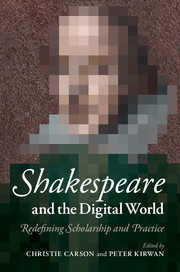Book contents
- Frontmatter
- Contents
- Notes on contributors
- Acknowledgements
- Shakespeare and the digital world
- Part I Defining current digital scholarship and practice
- Part II Defining current digital scholarship and practice
- Half-time: A pause for reflection
- Part III Redefining the boundaries and practices of Shakespeare studies online
- Part IV Redefining the boundaries and practices of Shakespeare studies online
- 14 Changing a culture with the Shakespeare Birthplace Trust
- 15 Developing a digital strategy
- 16 The impact of new forms of public performance
- 17 Creating a critical model for the twenty-first century
- Conclusion
- Index
- References
Conclusion
Digital dreaming
Published online by Cambridge University Press: 05 July 2014
- Frontmatter
- Contents
- Notes on contributors
- Acknowledgements
- Shakespeare and the digital world
- Part I Defining current digital scholarship and practice
- Part II Defining current digital scholarship and practice
- Half-time: A pause for reflection
- Part III Redefining the boundaries and practices of Shakespeare studies online
- Part IV Redefining the boundaries and practices of Shakespeare studies online
- 14 Changing a culture with the Shakespeare Birthplace Trust
- 15 Developing a digital strategy
- 16 The impact of new forms of public performance
- 17 Creating a critical model for the twenty-first century
- Conclusion
- Index
- References
Summary
In June 2013, the Royal Shakespeare Company partnered with Google Creative Lab to create its fortieth production of A Midsummer Night’s Dream, taking place in real time over the midsummer weekend as a combined digital and live event. Actors performed sections of the play to private, invited and public audiences over a three-day period, while online audiences were invited to engage with a cast of over forty fictional characters with Google+ accounts who blogged, tweeted, shared pictures and video, philosophised and chatted with each other. As Erin Sullivan notes elsewhere in this volume, ‘Stratford is a small town that can at times be difficult to get to’ (above 64), and this production attempted to close the transactional distance between the RSC’s physical and virtual audiences, creating the RSC’s version of the Globe’s ‘meaningful digital experiences that can stand alone from any real-world experience and act as a viable alternative for those who cannot access the physical space’ (Nelson, above 207).
The rationale was not merely to extend Stratford’s audience, however, but to investigate the potential for an entirely new version of Shakespearean engagement designed specifically for the digital sphere. Tom Uglow of Google’s Creative Lab explains:
One of the wonderful things about experiencing Shakespeare is the time it takes simply to immerse yourself in the language, and from then to understand what is going on. We want to do the same – but the other way around – contemporary language in contemporary streams of social media – which are just as incomprehensible until you immerse yourself in the stream, follow the characters, ‘hear’ the story and comprehend layers of meaning.
(2013)- Type
- Chapter
- Information
- Shakespeare and the Digital WorldRedefining Scholarship and Practice, pp. 238 - 257Publisher: Cambridge University PressPrint publication year: 2014
References
- 2
- Cited by



